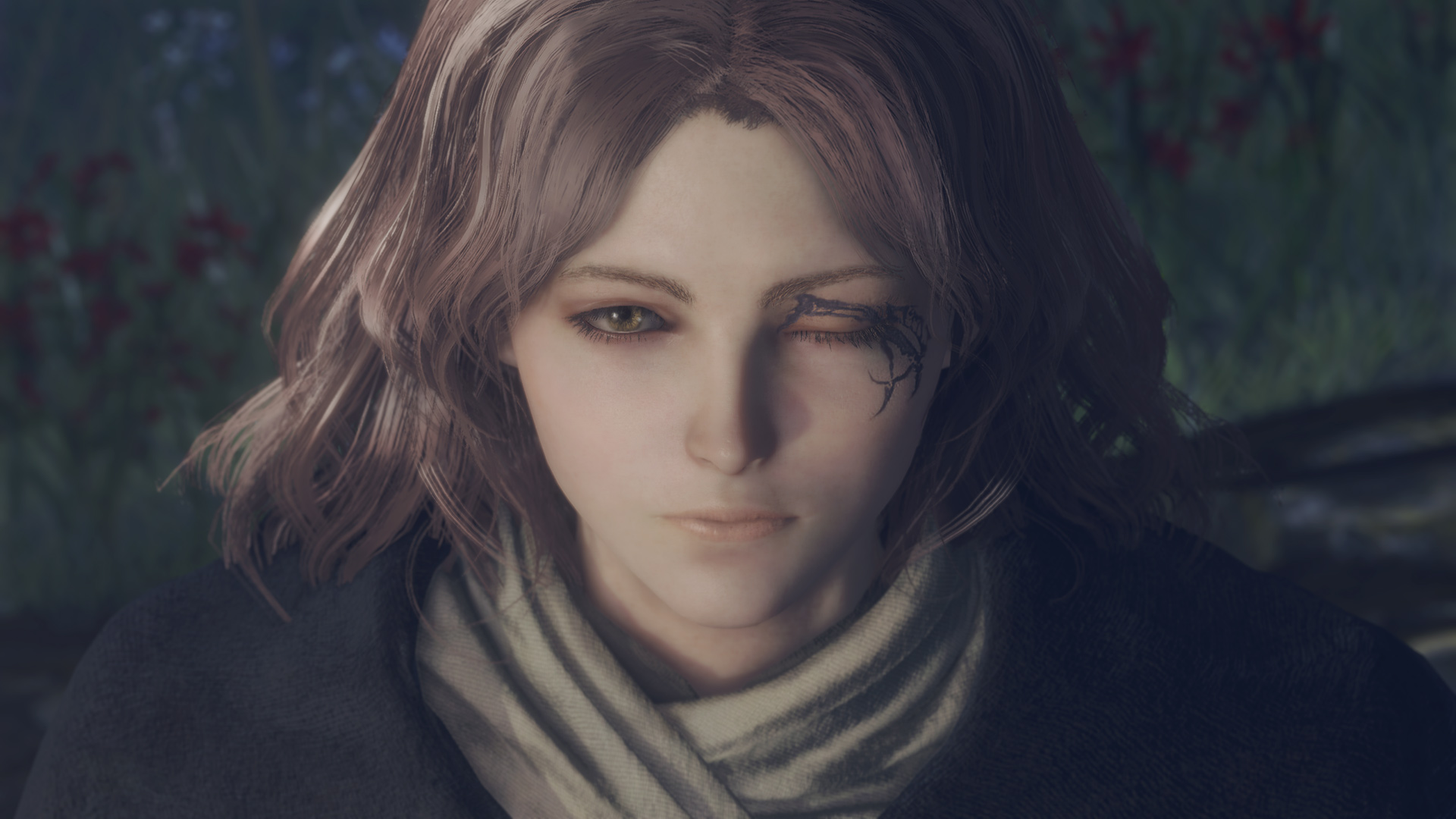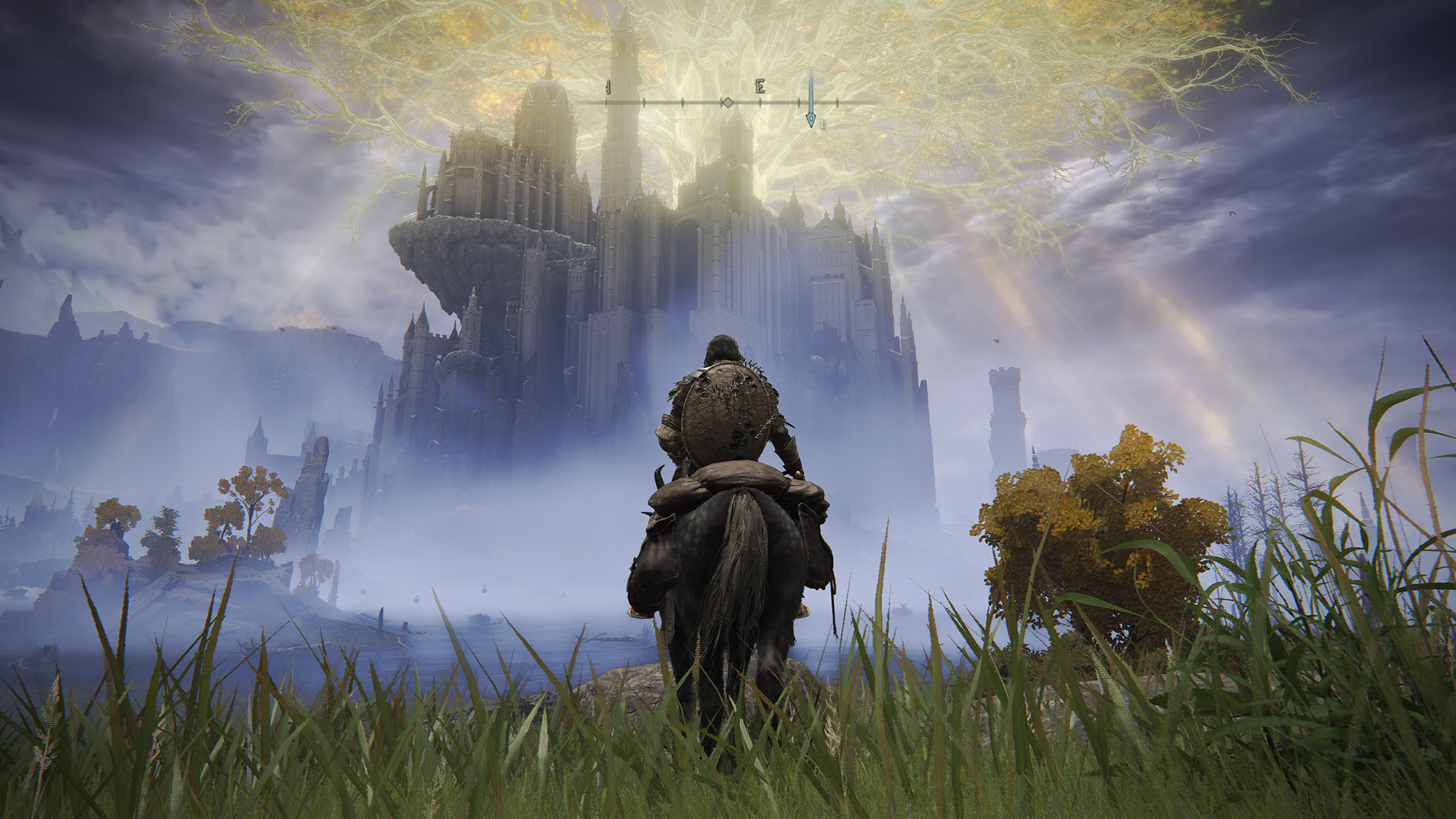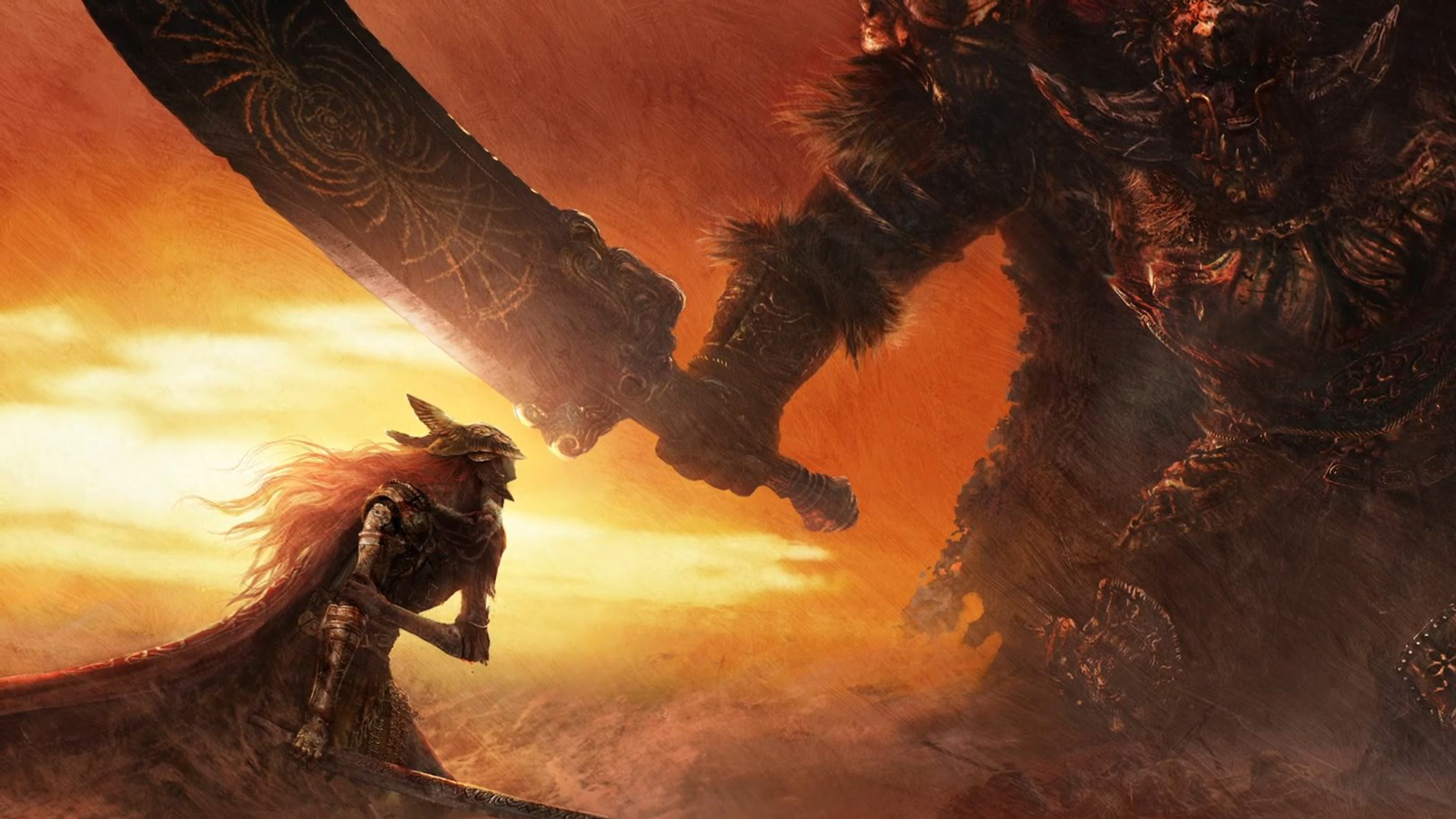Our Verdict
Elden Ring reaches new heights, but spends too much time in familiar FromSoftware territory.
PC Gamer's got your back
What is it? Open world action RPG set in a vast, sad world of big trees, beasts, and magic.
Expect to pay $60/£50
Release date February 25
Developer: FromSoftware
Publisher: Bandai Namco
Reviewed on: RTX 3080, Ryzen 9 3900X, 32GB RAM
Multiplayer? Yes
Link: Official site
The Dark Souls series, including Demon's Souls and Bloodborne, were open worlds before the term referred to the structure of games like Grand Theft Auto and Assassin's Creed. Far off castles and swamps caught your eye, you puzzled out a linear path towards them, fell down a hole and went looking for a new destination. They didn't need maps or icons, because their worlds were dense with clues and lures leading to new paths and back to old locations.
It worked, but spreading the mysteries and challenges of Dark Souls across an open world in the conventional sense—castles to infiltrate from many angles, swamps to ride through on horse, and beasts to chase you down—is the kind of thing you dream about.
Elden Ring, FromSoftware's successor to the Souls series, is huge in comparison to the previous games, and what's in its open world is undeniably Dark Souls.
It was a little better as a dream, though. The real Elden Ring is so much like Dark Souls at times that it feels distracting: there's a woman who levels you up, there's a throne to usurp, and many of the same types of monsters you find in Souls games, including some that are almost entirely identical. Scattering those things around an open world, it turns out, doesn't improve them, and robs them of the significance they had in the other games.
The Souls games are excellent, so despite reusing much of what we've seen before, it all works. Where Elden Ring retreads the past, it's like playing a new, remixed and remastered version of a Souls game—with some frustrating technical problems to really replicate those old times. And when Elden Ring reaches for something more, it soars.
Solid footing
Elden Ring's first few hours might remind you of gentler times in a game like Breath of the Wild, but no, FromSoftware has not abandoned its traditional brutality. Because of the open world, there are opportunities to circumvent some of the third-person, hack-and-slash fights that would eviscerate you in another Souls game, but it's still difficult—for me, one of the most difficult FromSoftware games.
Elden Ring features the same deliberate combat that's now conventional for these types of games, except here it's fully refined. You swing, the enemy swings, and both of you can interrupt each other's attacks with acute timing. The best Elden Ring fights, like the best Souls fights, ask that you study the way an enemy lunges at you and look for openings to punish them when they miss. In action, it's almost turn-based as you make your move and wait for the enemy to make theirs. These games are compelling because it rarely feels like the enemies use a different ruleset than you, so when you find a way to eke out a win, whether it's through magic spells or explosive bombs, it's like you outsmarted a dungeon master. Elden Ring echoes some of the best fights in the series with towering bosses and groups of enemies that force you to make snap judgments about which to prioritize, but it also echoes some of the worst, giving its late-game enemies and bosses so much health that beating them can be laborious instead of fun.
It's the scale of it that tricks you into thinking it's gentler at first. I spent hours prodding at the autumnal landscapes of Limgrave and Liurnia and didn't meaningfully raise my stats enough to withstand more than a swing from one of the two early major bosses. I defeated creatures on the surface and underneath the Lands Between, picked up useful items and gear, and upgraded my kit with the blacksmith, but none of that prepared me for Elden Ring's biggest threats. There are weapons and shields that confer unique powers, such as a shield that deflects magic back at enemies or a sword that flings out a blade projectile after a short charge up. They're all fun to play with while fighting weaker enemies out in the open world, but when it comes time to fight inside one of the game's "Legacy" dungeons, which are essentially Dark Souls levels set in castles and swamps, they don't often make a clear difference.
This glacial progression makes some bosses, whether within one of Elden Ring's tough "Legacy" dungeons or out in the world, seem insurmountable without another player splitting the attention of the boss so that, for at least a moment, you can squeeze a hit in. Elden Ring remained hostile for the 60 hours I've put into it, making the trek through it occasionally frustrating and directionless.
One pocket of land might house undead soldiers who fall to pieces with a poof of magic, while another one might contain ruthless giants who can shrug off an axe cleaved into their side. I spent much of Elden Ring unsure of how strong my character was and where I could go. It makes sense from my character's perspective—she's intruding on the land that exiled her—but for me, inscrutable encounters with high-health enemies felt like hitting an MMO level gate, except that because this is a Souls game, I couldn't tell whether I was expected to spend hours mastering these fights or leave them until later. That's one of the reasons Dark Souls worked better with carefully crafted boundaries.
Torrent, the horse you can summon almost any time while outside of Elden Ring's delineated dungeons and caves, is part of the problem, too. There are worse horses to ride in games (you don't have to feed this one and it rarely gets stuck on rocks or shrubs), but galloping past massive enemies or through camps to pluck an item up from the ground can be exhilarating, especially if you're dodging enemy arrows and swipes.
Eventually (or early on if I was feeling more adventurous), I faced fortifications and enemy types that specifically punished my four-legged freedom with heat-seeking arrows and trebuchet barrages. In certain areas, this pushback prompts you to use Elden Ring's surprisingly useful stealth mechanic to approach buildings, but other times it's hard to read what it's trying to convey. Torrent, while theoretically an empowering way to move through Elden Ring, led to confusion on how I should tackle certain battles or enemy camps.
A path new and old

Once you understand the language of Dark Souls, it's clear where you should head next in its more contained world and where you shouldn't. A poison-soaked area might drain your healing resources on an initial run, but a forest nearby is full of herbs to stock up on. Elden Ring's problems often have similar solutions, but because the map is so big and dense, it was hours before I understood where I was supposed to use items like anti-poison herbs and armor built to withstand magic attacks that I found.
Ruts like that are worth climbing out of to see Elden Ring's most tremendous moments. In its early hours, Dark Souls appears to be a typical fantasy setting with skeletons and dragons, but it eventually unfolds into an hourglass world where golden cities gaze down upon flooded ruins. When Elden Ring isn't recreating these locations, including that very same city down to the windows, or the poison swamp, or its own vacant version of the hub area, it's magnetic.
Elden Ring could have been anything, and yet, for an absurd amount of its length, it's disappointingly interested in reprising the Souls games.
Below the Lands Between lies one of the most beautiful areas in FromSoftware's oeuvre, rivaling the sakura-hues of Sekiro's final act. That's where I fought the Ancestor Spirit, a graceful, magical stag pulled from Norse mythology. In contrast to Elden Ring's grotesque dragons and stoic knights, the Ancestor Spirit is otherworldly as it weightlessly glides through the air. The fight is backed by a sparse score that drives the slow pace of the fight to give you the space to soak it up. FromSoftware games are known for difficulty, but one of the developer's greatest tricks is turning the tension on its head with a fight that's almost purely thematic, with just enough to do to keep you present. The Ancestor Spirit is like being deep into a rhythm game where the buttons melt away under your fingertips and the music alone carries you to the end. It's nigh-transcendent, and an example of how hard Elden Ring's best moments hit, when the iconography of the previous games disappears and FromSoftware's skill at orchestrating these types of battles shines through.
The reheated boss fights from the previous games undercut the impact. Although many of them are remixed and situated in different contexts, they are all blatant nods to what came before. I fought a spinning wolf with a sword in its mouth like Dark Souls' Sif, I dueled a knight with the same gait as Artorias, and I barreled through a library of minions to disrupt a floating boss that resembles Fool's Idol from Demon's Souls. Dark Souls 2 and 3 were full of references to the previous games, but neither of them promised to be a whole new universe birthed in part from the mind of a famous fantasy author. Elden Ring could have been anything, and yet, for an absurd amount of its length, it's disappointingly interested in reprising the Souls games, even if doing so puts it above so many other action RPGs. The infamous Basilisks that spew a lethal toxin at you are back again, except now those basketball eyes that weren't actually eyes are actually eyes. FromSoftware has seen the memes and the love for its games, and Elden Ring basks in it.
Wanting for more


Elden Ring guide: Conquer the Lands Between
Elden Ring bosses: How to beat them
Elden Ring dungeons: How to defeat them
Elden Ring paintings: Solutions and locations
Elden Ring map fragments: Reveal the world
Demon's Souls and Dark Souls didn't birth an entire genre and its voracious fans by being full of things the developer had already done. They created the trend, and Elden Ring simply continues it by using many of the same parts as the previous games. Its open world is bold, but Sekiro's new enemy types, emphasis on one-on-one combat, and parrying diverge from the Souls trilogy. While Sekiro didn't end up being one of my favorite of FromSoftware's games, I deeply respect it for the ways it asked for a very different approach.
Instead Elden Ring carries forward a lot of the things you'd expect, including rough performance on PC. Over time, it tends to intermittently stutter and slow down for brief moments, especially as you're out in the open world. I never died to a hiccup in performance, but it made me pause and restart the game fairly often to fix the issue. (Bandai Namco claims the day one patch will fix this.) There's a 60 fps lock, high RAM requirement, and limited graphics settings (you won't find DLSS or granular options for anti-aliasing). I hoped for better options and performance from a developer that's released several games on PC at this point.
Like with Dark Souls, though, Elden Ring's technical flaws are worth putting up with and will hopefully be fixed soon, either by modder or official patch. And when it stops clinging to the past so much and you plop off a cliff after being chased by wolves and find a swirling gate that takes you far outside the known map to meet a hunched over beast man, the idiomatic dream logic of Elden Ring reminds you that no other developer creates fantasy worlds this repeatedly transfixing.
Elden Ring is junk food for FromSoftware fans. It's more of what I already adore, but family sized. It has everything that makes these games so intoxicating, and that lodges their intricate fiction into my brain. But its devotion to what came before is distracting. It dulls the impact of those moments where Elden Ring leaps beyond its past to demonstrate why FromSoftware's games are unparalleled by all who attempt to replicate them. As another Souls game, I love Elden Ring, but as the latest game from FromSoftware, I wanted it to dream a little bigger.
Elden Ring reaches new heights, but spends too much time in familiar FromSoftware territory.
Tyler has covered videogames and PC hardware for 15 years. He regularly spends time playing and reporting on games like Diablo 4, Elden Ring, Overwatch 2, and Final Fantasy 14. While his specialty is in action RPGs and MMOs, he's driven to cover all sorts of games whether they're broken, beautiful, or bizarre.


